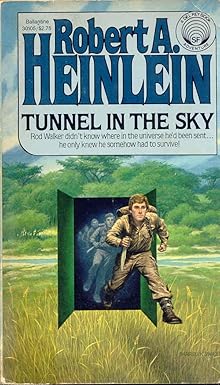
Consumer note: Holy cow, I do not recommend that you pay (as I type) $39.99 at Amazon for the mass market paperback in "Used: Acceptable" condition. (Original price $2.95) It's a good book, but…
My edition is an Ace 95¢ paperback, purchased … long ago, I guess. I'm pretty sure I read a school library version back sometime in the 1960s, and not since. I remembered some, not a lot.
It is one of Heinlein's later juveniles, originally published in 1955. The protagonist is Rob Walker, who is looking to take his "Advanced Survival" class final. Which involves being transported via a titular "tunnel" to an uninhabited planet with only whatever supplies he can carry. But the test only lasts a few days, so fatalities are rare.
But not this time. An exploding nova screws up the interstellar pathway; Rod and his classmates are stranded with no indication whether they might be rescued anytime, or at all. Not all the local fauna is friendly, but much of the real danger is (dun dun DUN) some of Rod's fellow students.
So there's a lot of Heinlein tropes here: not one, but two, wisdom-dispensing mentors. A lot of Heinlein dialog. A lot of implicit commentary on political authority and stable community building. It's like a fictional version of John Locke's Second Treatise of Civil Government! But there are also overtones of Lord of the Files, albeit with older kids.
And it really shows Heinlein's struggle with 1950s "juvenile" straightjacket. There's a surprising amount of adult behavior going on. (Hey, where do you think those babies are coming from.) And Rod is far from perfect: he's occasionally hot-headed, petulant, and careless.
Overall, I'd rank it just below the top tier of Heinlein's juvies. (But much of that is due to personal taste, not cosmic critical faculties.)
![[The Blogger and His Dog]](/ps/images/me_with_barney.jpg)



